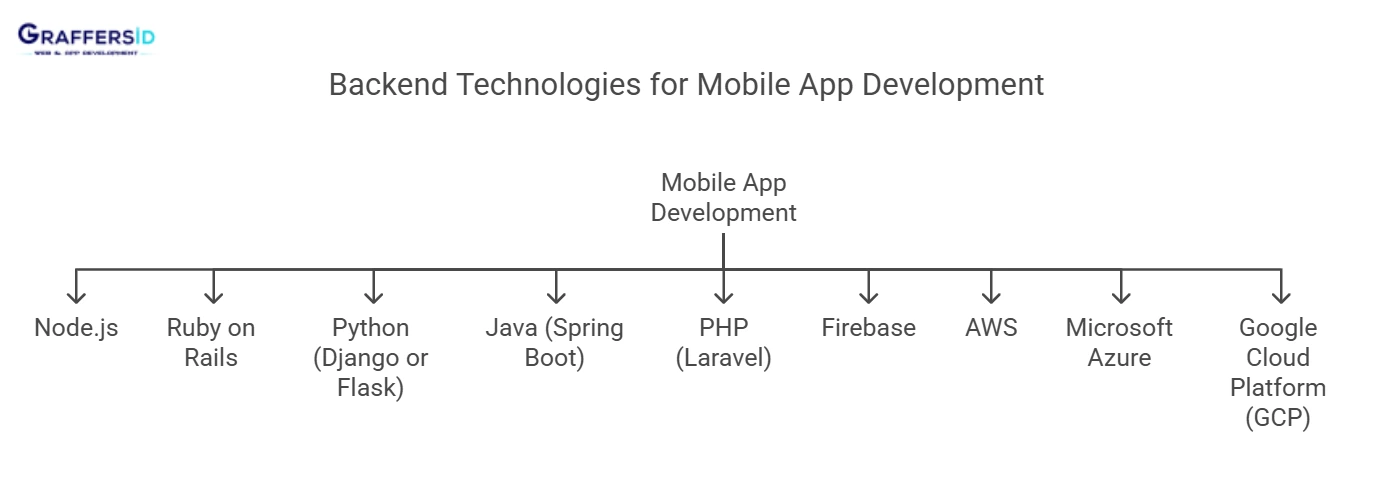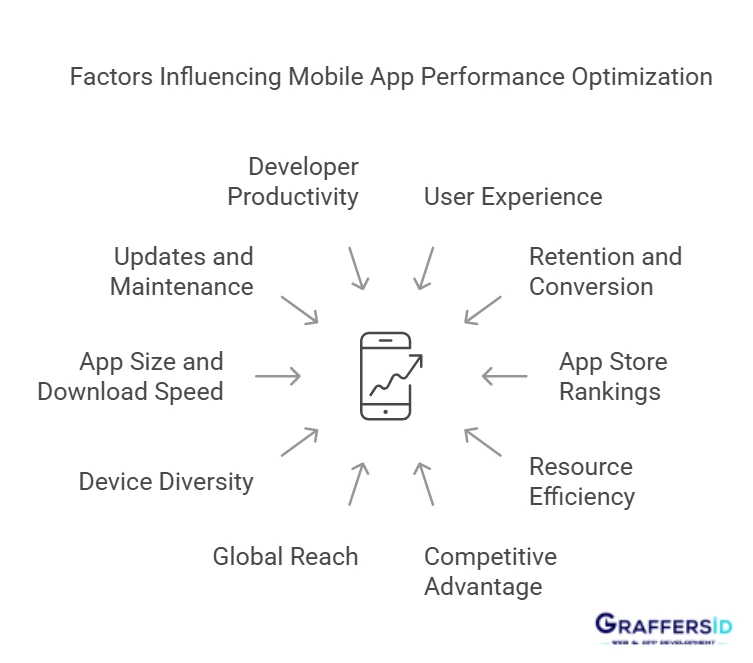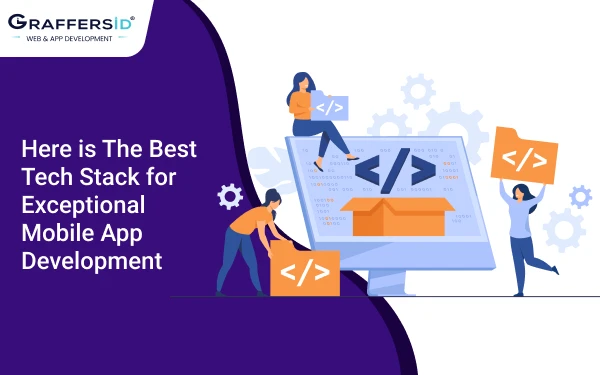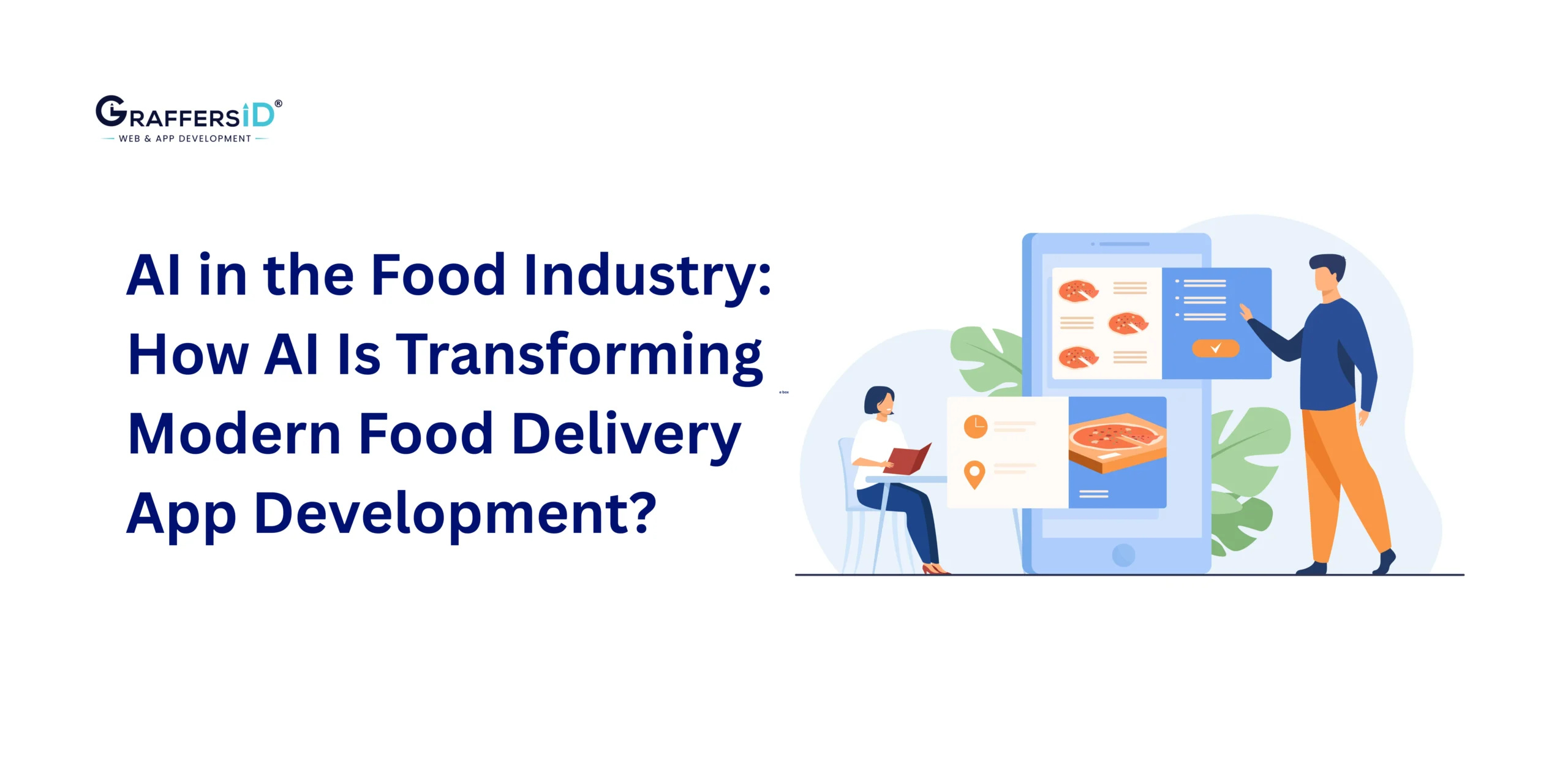Bringing an idea to execution, engaging target users, and driving profit. Isn’t the app in development is more than a tough task? Developers strive to develop challenging applications that can lure the tech-savvy generation, however, in most cases their product backfires due to the wrong choice of the technology stack.
The competition in the mobile market is rising to the next level, and coming up with an off-putting and buggy application that is built using an outdated tech stack is a bad idea. This will not only hamper the reputation of the firm but also make your competitors succeed.
To prevent any danger to your brand value and deliver an outstanding experience, it is crucial to choose the right technology stack for mobile app development. The right technology stack will not only give life to your project but will also make it scalable and committed to the functional requirements. In addition to this, a wisely chosen technology stack results in lower costs and less time for mobile app development.
Here are the top technology stacks that can you choose to create a top-quality application:
Native App Development
Native App Development includes using platform-specific software development kits, programming languages and other tools provided by operating system vendors. As a result, building native applications requires you to employ separate mobile app development technologies for each. Popular applications like Pokemon GO and Lyft utilize the native approach.
Technology Stack for iOS Apps in 2025
Here is a mobile app technology stack for building a native iOS application
Programming languages
Objective C
Based on C, Objective C is a High-Level Language, developed for building iOS applications before the inception of Swift. This superset of C language is used by several app development companies to build applications for Mac, iPad, iPhone, Apple Watch, and more devices.
Some of the reasons which make Objective C the reliable option are:
- Easy use of private APIs
- Compatibility with C++
- Massive community support
- Plenty of third-party libraries
- Highly approved
- Simple and accessible to Apple technologies
Swift
Swift, a widely-used programming language for building top-notch iOS and OS X applications, is a multi-paradigm open-source language. A recent survey by Stack Overflow shows that Swift is the highly preferred language by the professional developer community.
Here are a few reasons why Swift is in the focus of attention:
- Faster and better performance
- Compatible with Objective C
- Multi-device support
- Dynamic libraries
- Active community support
- Safe and less prone to errors.
Toolkit:Apple Xcode:
If you are using Swift as the programming language for developing the native application, then you will need Apple Xcode as the toolkit. The full-featured development environment offered by the Apple Xcode toolkit lets you create mobile as well as desktop applications. Xcode comes with instrumentation and debugging tools, integrated support for Git repositories, a graphical editor to build user interfaces and integrated documentation.
SDK: iOS SDK
The iOS SDK includes an API that serves as a link between software applications and their platform. APIs can be built in several ways and include helpful programming tools.
Technology Stacks for Android Apps in 2025
Here is the mobile app technology stack for building native Android application
Programming Language:
Java
For Android App Development, Java is always at the top of the list. Java is an object-oriented programming language that comes with rich libraries and tools that make it easy to craft top-quality mobile applications. Here are some of the reasons which make Java one of the preferred languages to craft Android applications:
- Portable and scalable
- Highly secured
- Automatic memory management
- Multi-threading capability
- Huge open source support ecosystem.
Kotlin
When compared to Java, Kotlin is new and came into existence in 2011. The language is a perfect solution that combines simplicity and power.
Kotlin is not only a popular OOP language but also supports high-order functions and lambadas. It increases speed and makes it easier to perform day-to-day development tasks.
Here are the benefits of using Kotlin:
- Language is concise and safe
- Extension functions
- Multi-platform
- Active community
- It helps to reduce bugs.
Toolkit: Android Studio and Android Developer Tools
Android Studio comes with performance tooling, code editing, flexible and instant build/deploy system. It helps you in building high-quality and unique applications.
Android Developer Tools offers Android-specific coding support and let developers use emulators, graphical UI builder, on-device debugging tools, and scriptable test automation support.
SDK: Android SDK
Android SDK uses components that can be downloaded separately. Third-party add-ons are also available for download.
Both Apple and Google provide app developers with interface elements, development tools and SDKs.
Cross-Platform App Development
This approach means developing a mobile application that can be used flawlessly on multiple mobile platforms. A cross-platform approach allows developers to build an application using a single code base, which can run on different platforms simultaneously.
React Native+JavaScript
React Native is a Javascript framework, used for writing mobile applications that look native on both Android and iOS. It uses the same fundamental UI building blocks as Android and iOS apps.
React Native introduces a radical, novel, and highly functional approach to constructing the user interface. With React Native, your application logic is written and runs in Javascript, and the application User Interface is completely native. The perfect examples of such applications are Skype and Instagram.
You can also use the Typescript language to build a cross-platform application. Typescript provides excellent features for quick and easy error detection when writing React components. Generic components are of great benefit in the TypeScript toolbox. They provide an extra level of safety when tightening the feedback loop, writing components and helping you find errors quickly.
Xamarin+C#
Xamarin is a tool for cross-platform mobile app development, which uses C# as the main-language for cross-platform development. C# is a statically typed language with IDE support and mature tooling. Apps written in C# are cross-compiled to native iOS and Android binaries. It’s even possible to use functionality from within C## code and device-specific APIs. For example, applications like Slack and Pinterest are built with Xamarin.
Hybrid App Development
Hybrid App Development makes use of web technologies such as HTML5, CSS and Javascript. The shared
Technology Stack for Hybrid Apps in 2025
Cordova/PhoneGap:
Apache Cordova is an open-source framework that is mainly employed to run Javascript-based applications. The functionality of Native devices is exposed via HTML-based applications and JavaScript APIs and hence access device-specific functionality like cameras and sensors.
Developers mainly rely on CSS and HTML to build the user interface as PhoneGap supports libraries such as Angular JS, jQuery and Knockout.js.
While using Cordova, developers don’t rely only on HTML and CSS to build the user interface as it supports numerous frameworks and libraries such as Angular JS, jQuery and Knockout.js.
Ionic:
Ionic is an Angular JS-based framework, which is why it supports the community with a famous framework and shares a whole set of advantages. The critical ability to make hybrid applications have a native look is also well implemented with Ionic.
With Ionic, you just need to design an application once and you can deploy it across Android, iOS, and Windows devices. The key benefits of using Ionic include:
- Supports robust development
- No need to code everything from scratch
- Several ready-made plugins
- AngularJS compatible
- Engaged community
Which backend technologies are suitable for mobile app development projects?
There are several backend technologies suitable for mobile app development projects, each with its own strengths and use cases. The choice of backend technology depends on factors such as the complexity of the app, the team’s expertise, scalability requirements, and the specific features you need to implement. Here are some popular backend technologies used in mobile app development:

Node.js:
Node.js is known for its event-driven, non-blocking I/O model, which makes it well-suited for real-time applications and APIs. It’s often used with frameworks like Express.js to build RESTful APIs and handle server-side logic.
Ruby on Rails:
Ruby on Rails is a rapid development framework that promotes convention over configuration. It’s great for startups and small teams looking to quickly build and prototype their backend.
Python (Django or Flask):
Python is a versatile language with frameworks like Django and Flask that are commonly used for backend development. Django provides an extensive set of features for larger applications, while Flask is more lightweight and flexible.
Java (Spring Boot):
Java remains a popular choice for enterprise-level applications. Spring Boot, a framework built on top of the Java Spring framework, offers a robust ecosystem for building scalable and maintainable backend services.
PHP (Laravel):
PHP, despite its age, is still widely used for backend development. Laravel is a modern PHP framework that emphasizes elegant syntax and developer-friendly tools.
Firebase:
Firebase is a comprehensive backend-as-a-service (BaaS) platform provided by Google. It offers a variety of services such as real-time databases, authentication, cloud functions, and more, making it a great choice for startups and projects with rapid development cycles.
AWS (Amazon Web Services):
AWS provides a range of cloud services that can be used as the backend for mobile apps. Services like AWS Lambda, DynamoDB, and API Gateway allow you to build scalable and reliable backends.
Microsoft Azure:
Similar to AWS, Microsoft Azure offers a suite of cloud services suitable for building mobile app backends. Azure Functions, Azure SQL Database, and Azure App Service are commonly used services for mobile app backends.
Google Cloud Platform (GCP):
GCP provides services like Google Cloud Functions, Cloud Firestore, and Google App Engine that can be used for building mobile app backends.
Custom Backend:
Depending on the complexity of your project and the specific requirements, you might consider building a custom backend using programming languages like Go, Kotlin, or C#. This gives you complete control over your backend’s architecture and features.
Ultimately, the choice of backend technology should be based on your project’s needs, the skills of your development team, and your long-term goals for the mobile app. It’s important to consider factors like scalability, security, ease of maintenance, and the availability of third-party libraries and integrations when making your decision.
How important is it to optimize mobile apps for performance?
Optimizing mobile apps for performance is highly important for several reasons:

User Experience:
Performance directly impacts user experience. Slow-loading apps, laggy interactions, and delays can frustrate users and lead them to abandon your app. A smooth and responsive experience enhances user satisfaction and engagement.
Retention and Conversion:
Users are more likely to continue using an app and make in-app purchases or conversions if the app performs well. Poor performance can lead to higher bounce rates and lower retention rates.
App Store Rankings:
Both the Apple App Store and Google Play Store consider app performance as a factor in their rankings. Apps that provide a better user experience are more likely to receive positive reviews, higher ratings, and better visibility in search results.
Resource Efficiency:
Mobile devices have limited resources such as processing power, memory, and battery life. Optimizing performance helps minimize resource consumption, leading to longer battery life and better overall device performance.
Competitive Advantage:
In a crowded app market, delivering a high-performance app can give you a competitive edge. Users are more likely to choose and recommend apps that offer a smooth and seamless experience.
Global Reach:
In some regions, internet connectivity might be slower or less reliable. Optimizing your app’s performance can make it accessible to users in areas with varying levels of network quality.
Device Diversity:
There’s a wide range of mobile devices with varying specifications and capabilities. Performance optimization ensures that your app works well across different devices, leading to a larger potential user base.
App Size and Download Speed:
Optimized apps are often smaller in size, which means faster download and installation times. This is crucial, especially for users on slower connections or with limited storage space.
Updates and Maintenance:
As your app evolves, new features and updates can introduce performance issues if not managed properly. By prioritizing performance optimization, you can mitigate the risk of degradation in subsequent releases.
Developer Productivity:
Well-optimized code tends to be more organized and maintainable. This can lead to improved developer productivity and faster debugging, as performance-related issues are minimized.
To achieve optimal app performance, consider techniques like code optimization, efficient memory management, asynchronous operations, lazy loading, caching, and minimizing network requests. Regular performance testing and profiling can help identify bottlenecks and areas for improvement. Keep in mind that while performance is crucial, it should be balanced with other considerations such as functionality, design, and user needs.
What Makes Mobile App an Efficient Marketing Tool for Your Brand?
Gone are the days when advertising was considered as the prominent marketing to promote a brand. With rapid transformations in the digital landscape, having a strong presence over the mobile phone has become an essential element to thrive. Mobile apps have emerged as an effective marketing solution, which not only automates the business but also provides better customer service. Thus, brands are hiring dedicated remote developers for developing mobile apps for their businesses.
The brands with the right application at their behest, do not face a struggle in establishing themselves, instead, app enables them to foster a deep connection with netizens of all demographics and age groups.
Why brands should think about building an app?
According to a recent study, people spend 70% of their time on a mobile phone, out of which 90% of the time is spent on applications. People have their smartphones in hand wherever they go, which implies that you can reach your target audience almost anytime and anywhere through a mobile app.
Brands have realized the power of mobile applications and that goes simply beyond selling any product or service. Apps have opened up new marketing avenues, and provide businesses with an opportunity to engage in creative ways and turn them into customers.
Desktop internet usage is dropping and internet usage over the mobile phone is growing significantly. It is estimated that by 2021, there will be more than 7 billion users worldwide. Mobile apps are an excellent marketing channel for brands. It helps companies convey brand messages, connect with the audience, keep users engaged, and build customer loyalty in a crowded marketplace.
Conclusion
The aforementioned are the trending technology stack for mobile app development. You can choose the one which aligns best with your vision and the needs of your project. The informed choice will not only make a dominating presence in the web world but will also help you hit the moon.
At GraffersID, we have highly experienced and skilled developers on board who are ready to assit you in your application development journey. Contact us today to discuss your idea further!






